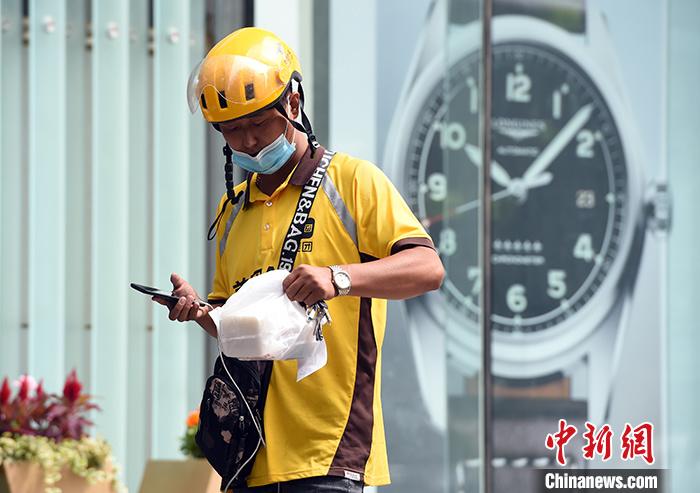Chinanews.com, August 18th. How does the "Guiding Opinions on Safeguarding Labor Security Rights and Interests of New Employment Forms" consider strengthening occupational injury protection?
You Jun, deputy minister of the Ministry of Human Resources and Social Security, stated on the 18th that in accordance with the principle of urgent use first, it is formulating the occupational injury protection method for flexible employees on the platform, and plans to launch occupational injury protection pilot projects, and strive to solve the problem of unbalanced and inadequate occupational injury protection as soon as possible. .
Data map: A take-out courier waits for customers to pick up a meal outside the office building.
Photo by China News Agency reporter Hou Yu
A few days ago, the executive meeting of the State Council deliberated and approved the "Guiding Opinions on Safeguarding the Labor Security Rights and Interests of Workers in New Employment Forms" (hereinafter referred to as the "Opinions").
On the 18th, the State Council Information Office held a regular policy briefing of the State Council to introduce the relevant situation of the guidance on safeguarding the labor security rights and interests of laborers in the new employment form.
At the meeting, a reporter asked questions and said that at present, groups such as foreign sellers are very concerned about their protection after accidents such as traffic accidents.
How does the "Opinions" consider strengthening occupational injury protection?
You Jun said that in recent years, groups such as takeaway brothers have suffered from accidents and inadequate protection, which is distressing.
It is the basic social cognition for workers to obtain effective assistance after occupational injuries.
Since my country’s current work injury insurance system is designed for traditional employment methods and is based on labor relations, some takeaways and other employment methods are relatively flexible and have not established labor relations with enterprises, so they cannot be directly included in the current work injury insurance system. To protect their rights.
Although most platform companies purchase commercial insurance such as accidental injury insurance, they have initially solved the problem of whether they have occupational injury protection.
However, due to various reasons, the level of protection is too low, and these problems cannot be effectively solved by market forces alone.
"In response to this situation, in accordance with the principle of first priority, we are formulating occupational injury protection measures for flexible employees on the platform, and plan to carry out occupational injury protection pilot projects, and strive to solve the problem of unbalanced and insufficient occupational injury protection as soon as possible." You Jun pointed out, Preliminary considerations:
First, it is necessary to clarify that the occupational injury insurance for the flexible employment of the platform is the positioning of social insurance, that is, the government-led insurance system, which is established and implemented under the framework of the current industrial injury insurance system.
The second is to innovate institutional models, adapt to the characteristics of platform online operations, innovate policies and methods, and unblock the occupational injury protection channels for platform enterprises and platform flexible employees.
The third is to pilot projects first. Considering that the establishment of an occupational injury protection system for flexible employment personnel on a platform is a system innovation with complex relationships, a wide range of coverage, and a strong policy. It is a brand-new field. Therefore, it is proposed to start with those with a high degree of concern from all walks of life and a greater risk of occupational injury. Starting with industries such as travel, food delivery, instant delivery, and intra-city freight, select some provinces and cities with a better working foundation to pilot the program first. After the system is mature, it will be fully implemented in an orderly manner to effectively protect the rights and interests of flexible employees on the platform.

